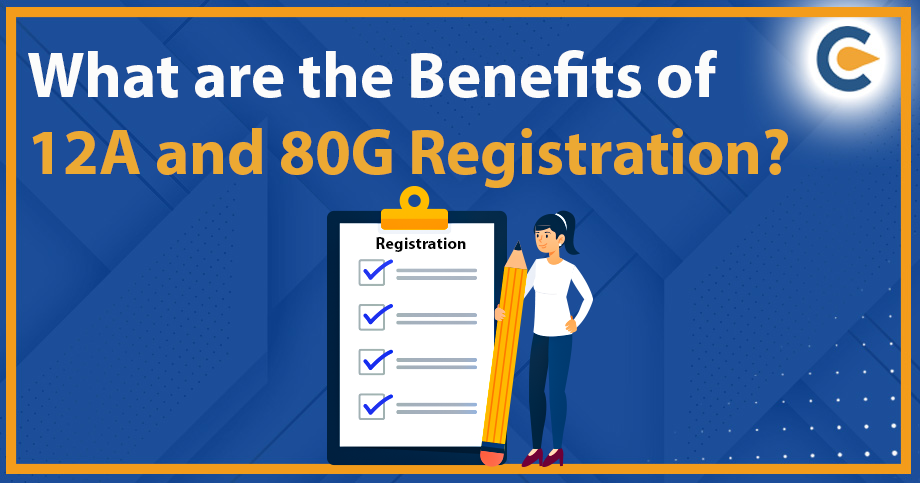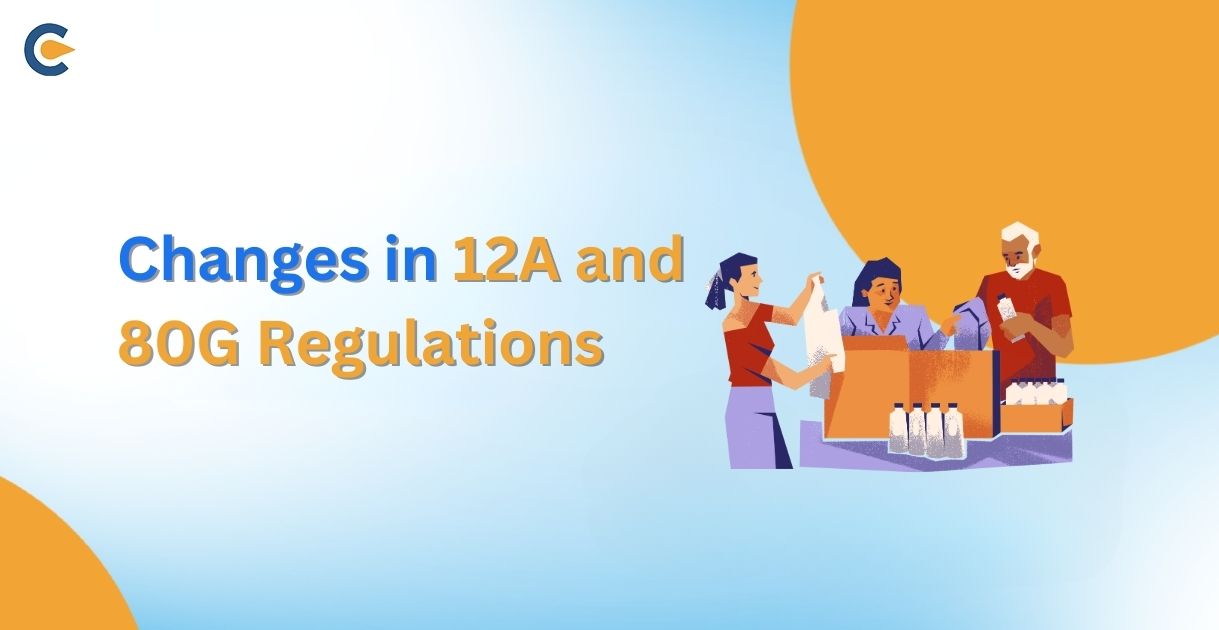There are certain organisations which are liable for tax exemptions as provided under the Income Tax Act, 1961. Organisations not operating for profits, like NGOs, charitable trusts, religious organisations, Section 8 companies, are made eligible for tax exemptions. Section 12A & Section 80G of the Income Tax Act, 1961 provide for such exemptions toinstitutions established in India which are not operating for profits. These organisations need to get registered under Sections 12A and 80G and obtain certificates thereunder to avail of the exemptions, failing which they would not receive the many benefits that would otherwise be available after obtaining these certificates. Before obtaining certificates under the above sections, the institution must have an NGO registered under the Income Tax Act by filing Form 10A; only then can it apply for tax exemptions. Scroll down to check the benefits of 12A and 80G Registration in India.
Meaning of 12A and 80G Registration
Before we discuss the benefits of 12A and 80G Registration in India, let’s understand the meaning of 12A and 80G Registration in India.
Section 12A Registration
Section 12A registration applies to organisations working not for profit like NGOs, charitable trusts, religious organisations, Section 8 companies. Once duly registered under 12A, these organisations are eligible to avail of tax exemptions on their surplus income. It is a one-time registration and the certificate of an exemption obtained hereunder has lifetime validity. It is advisable that NGOs and other not-for-profit organisations get registered under this section right after their incorporation and avail of the beneficial tax exemptions.
There are certain documents required to obtain Section 12A registration, namely:
- Documents evidencing the creation of the trust or organisation (trust deed or any other instrument, certificate of incorporation, copies of MOA and AOA for Section 8 companies, MOA and registration certificate for societies)
- Copy of PAN of the organisation
- Form 10A
- Where the organisation is a trust, the annual accounts for the last three years.
Section 80G Registration
Section 80G Registration under the Income Tax Act, 1961 is provided to organisations working not for profit like NGOs, charitable trusts, religious organisations, Section 8 companies. The main aim of this certificate is to encourage donors to provide donations. The donors making such donations are eligible to avail tax reductions. All they have to do is attach the receipt of the donation made, with information as to the name of the donor, date of donation and PAN of the organisation, to avail the exemption.
There are some crucial documents which are required to be provided while applying for Registration under Section 80G namely:
- Documents evidencing the creation of the trust or organisation (trust deed or any other instrument, certificate of incorporation, copies of MOA and AOA for Section 8 companies, MOA and registration certificate for societies)
- Copy of PAN of the organisation
- Form 10G
- No Objection Certificate (NOC) from the owner of the property where the registered office is situated
- Copy of the utility bills of the organisation
- List of donors with details of their address and PAN
- documents related to the book of accounts and income tax returns
- Details of welfare activities carried out by the organisation within the last 3 years
- Where the organisation is a trust, there is a detailed list of the board of trustees.
Benefits of Obtaining 12A and 80G Registration
The following are the benefits of 12A and 80G Registration:
Benefits of 12A Registration – Benefits of 12A and 80G Registration
There are many benefits available to non-profit institutions when registered under Section 12A of the Income Tax act, 1961. Following are some of the benefits available once registered:
- Tax Exemption
By furnishing a 12A certificate, such institutions are exempted from paying tax on income generated.
- Grants and Funds from Government and International Organizations
12A certificate makes these institutions eligible to avail funds, various schemes and grants from the government and international organisationsas it grants legitimacy to the institutions.
- Proof of Existence
A certificate under 12A acts is considered legitimate proof of the existence of the institution, and this proof can be used to avail the aforementioned international and government schemes, grants and funds.
Benefits of obtaining Registration under Section 80G – Benefits of 12A and 80G Registration
The direct beneficiary under 80G is the donors of these organisations, while the organisations also benefit as these benefits fuel ore donors to make sizeable donations to these non-profit organisations. The benefits arising under the 80G certificate are as follows:
- Tax exemption to donors
The donor is eligible to deduct a portion of the amount donated to these organisations from his/her taxable income.
- Increase in goodwill and credibility of the organisation
80G certificate gives legitimacy and credibility to the organisation and hence helps in increasing its goodwill, which will further encourage more donors to donate.
- Government funding
NGOs and other charitable organisations with 80G registration are likely to receive more government funding and international contribution.
Eligibility to obtain 12A and 80G registration
Registrations under Section 12A and 80G are provided to NGOs, charitable organisations, trusts and societies if they fulfil the following conditions:
- No income must be generated from the business.
- These organisations should either be charitable or trust or registered societies or Section 8 companies.
- These organisations must be using their assets or income only for the purpose of charity.
- They should maintain a regular book of accounts of the activities of the organisation
- The owners or trustees should not be deriving undue benefits from the organisation’s funds.
- The work should not be related to the benefit of particular religion or caste.
- If these organisations have income generated from any business, there should be a separate book of accounts for the same, and any donations received for charitable purposes shall be kept separate.
Conclusions
Charitable organisations working not for profit are rightly given benefits under the Income Tax Act, 1961, in the form of tax exemptions and various other benefits. After registering one’s NGO or other similar organisation, one should also get it registered under Sections 12A & 80G of the Income Tax Act to reap the benefits of 12A and 80G Registration which the legislature has provided to them. These benefits of 12A and 80G Registration not only encourage more people to get involved in charitable work but also pushes existing donors to make more donations, while also attracting new donors to the organisation.
Read our Article:Tax Exemption for NGOs: Section 12A & 80G











